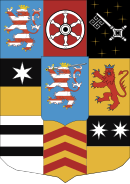Our website is made possible by displaying online advertisements to our visitors.
Please consider supporting us by disabling your ad blocker.
Princess Elisabeth of Hesse and by Rhine
| Princess Elisabeth | |||||
|---|---|---|---|---|---|
| Grand Duchess Elizabeth Feodorovna of Russia | |||||
 Photograph by Charles Bergamasco, 1885 | |||||
| Born | Princess Elisabeth of Hesse and by Rhine 1 November 1864 Bessungen, Grand Duchy of Hesse, German Confederation | ||||
| Died | 18 July 1918 (aged 53) Alapayevsk, Russian SFSR | ||||
| Burial | Church of Mary Magdalene, Gethsemane, Jerusalem | ||||
| Spouse | |||||
| |||||
| House | Hesse-Darmstadt | ||||
| Father | Louis IV, Grand Duke of Hesse and by Rhine | ||||
| Mother | Princess Alice of the United Kingdom | ||||
| Religion | Russian Orthodox prev. Lutheranism | ||||
| Signature |  | ||||
| Grand Ducal Family of Hesse and by Rhine |
|---|
 |
| Louis IV |
Grand Duchess Elizabeth Feodorovna of Russia (born Princess Elisabeth of Hesse and by Rhine; 1 November 1864 – 18 July 1918) was a German Hessian and Rhenish princess of the House of Hesse-Darmstadt, and the wife of Grand Duke Sergei Alexandrovich of Russia, the fifth son of Emperor Alexander II of Russia and Princess Marie of Hesse and by Rhine.
A granddaughter of Queen Victoria and an older sister of Alexandra, the last Russian Empress, Elisabeth became famous in Russian society for her dignified beauty and charitable works among the poor. Elisabeth married grand duke Sergei on 15 (3) June 1884. The couple never had children of their own, but their Ilyinskoe estate was usually filled with parties that Elisabeth organized especially for children. They eventually became the foster parents of Grand Duke Dmitry Pavlovich and Grand Duchess Maria Pavlovna, Sergei's niece and nephew.
After the Socialist Revolutionary Party's Combat Organization assassinated her husband with a bomb in 1905, Elisabeth publicly forgave Sergei's murderer, Ivan Kalyayev, and campaigned without success for him to be pardoned. She then departed the Imperial Court and became a nun, founding the Marfo-Mariinsky Convent dedicated to helping the downtrodden of Moscow.
During The February Revolution of 1917 ended the Tsar rule in Russia, and Elisabeth's brother-in-law Nicholas II had to abdicate. The political upheavals initially had no impact on life in the monastery. However, Elisabeth was worried about her relatives, who were under house arrest in the Alexander Palace in Tsarskoye Selo. She kept in touch with her sister Alexandra, even when she was in exile in Tobolsk, although under considerably more difficult conditions. In 1918, she was arrested and ultimately murdered by Bolsheviks. In 1981, she was canonized by the Russian Orthodox Church Abroad, and in 1992 by the Moscow Patriarchate.
Previous Page Next Page
Prinses Elisabeth van Hesse-Darmstadt AF إليزابيث أميرة هسن والراين Arabic اليزابيث اميره هسن والراين ARZ Yelizaveta (Hessen və Reyn şahzadəsi) AZ الیزابت هسن و راین AZB Елізавета Фёдараўна BE Елисавета Фьодоровна (Ела) Bulgarian Elisabeth von Hessen-Darmstadt BR Elisabet de Hessen-Darmstadt Catalan Alžběta Ruská Czech


